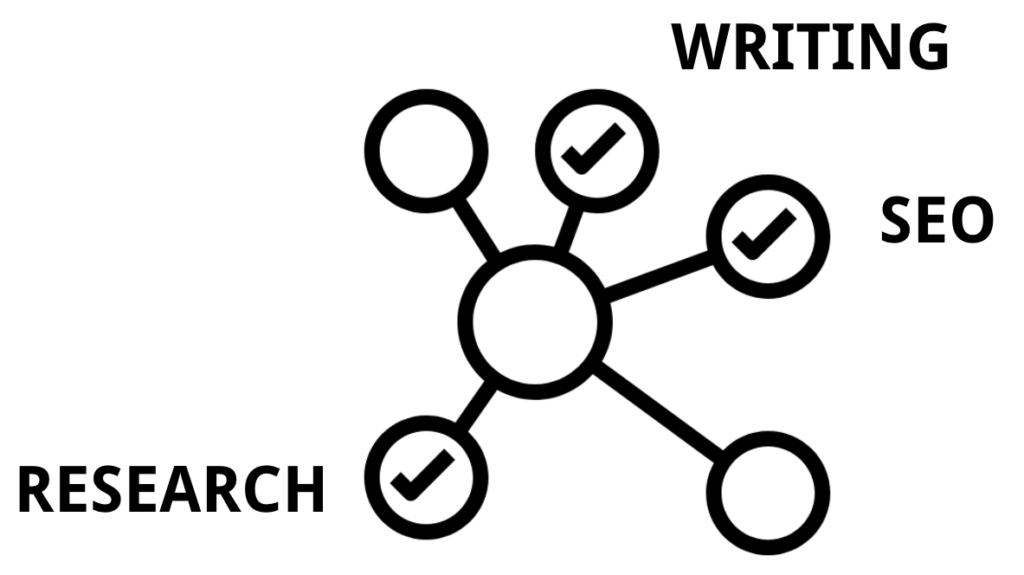Gone are the days of linear career trajectories. Most people will live several work lives, and careers have become increasingly mobile. While deep expertise in a given domain can lead to a successful career, it is also a more rigid approach which may limit the number of lateral opportunities. In contrast, adjacent skills can open doors and foster serendipity in a career.

Building skills through adjacency
The Merriam-Webster dictionary defines “adjacent” as “having a common endpoint or border.” Adjacent skills are skills that are close or related to the ones you already have.
The main advantage is that you are not starting from scratch: you can usually use some of the knowledge from your existing skills to acquire adjacent skills. Not only will the process feel easier, but you will reinforce your current knowledge.
Which is why the second advantage is that such skills augment your current skills. Instead of acquiring completely unrelated skills, developing adjacent skills is a way to complement what you already know.
Not only building skills through adjacency is easier and helps reinforce your current knowledge, but it can be incredibly helpful in a work setting to differentiate yourself and better collaborate with your teammates.
The benefits of adjacent skills
While it’s perfectly fine—and fun!—to learn for the sake of learning, acquiring adjacent skills has many benefits. This list focuses on teamwork, but they can be applied in many contexts, such as working with freelancers or managing a multi-disciplinary project.
- Increase empathy for teammates. Each discipline features its own set of complex skills. However, we often think our job is more complex than our teammates. When an engineer learns about the job of a technical writer, when a UI designer learns about the job of a user researcher, they can appreciate the complexity of their teammates’ job and become more empathetic as a result.
- Improve communication. Beyond empathy, having adjacent skills also leads to better communication by acquiring the appropriate vocabulary used by other teammates.
- Sustain motivation at work. While you may be enjoying your work, it may sometimes feel tedious to work on the same aspects of a project for long periods of time. Having adjacent skills means you can switch between a wider range of tasks.
- Build a distinctive viewpoint. Having skills from various areas that are relevant to your work will enable you to see overlaps and connections where other people don’t, bringing to the table non-evident solutions that may be more effective than the obvious ones.
- Expand career perspective. There are way fewer designers who can code and coders who can design than the total number of designers and coders in the candidate pool. Building skills through agency will open new doors and even allow you to craft a unique role for yourself.
- Better evaluate candidates. When you need to hire someone—say, if you are a technical founder who needs to hire a product manager—having adjacent skills will allow you to better assess their skill set.
Again, these can be helpful not only when working as part of a team or managing a team. Whenever you work with someone else, knowing (even a little) about their job will lead to a more fruitful collaboration.
10 examples of adjacent skills
Potential adjacent skills are not always obvious. If you need some inspiration, here is a list of ten adjacent skills which may be helpful whether you are a writer, a designer, an engineer, a product manager, or a marketer.
| Main skill | Adjacent skill |
| Writing | SEO |
| Design | Illustration |
| Content marketing | Social media marketing |
| Coding | Technical writing |
| Financial analysis | Scripting |
| Product management | People management |
| Interface design | User research |
| Engineering | Project management |
| Marketing | Psychology |
| Email marketing | Community management |
A good exercise is to sit down and try to brainstorm as many potential new skills relevant to your current role as possible. While most of the skills in the above list are hard skills, you may want to consider soft skills such as negotiation and time management as well.
Once you have a raw list of potential skills, choose one to focus on by asking yourself the following questions:
- Intrinsically speaking, how curious am I about this skill?
- Based on my current skill set, how easy will it be to acquire this skill?
- Based on my current work environment, how useful will this skill be?
Ideally, the new skill you choose to acquire should make you feel curious, feel relatively easy to acquire, and be useful in your current work environment. However, it’s fine if you are missing one of these three criteria. For example, you may feel extremely curious about a skill and know it will be helpful for your job, but it will be difficult to learn.
Adjacent skills are a great way to widen your career perspective by building a multi-faceted profile. And even if your goal is to start your own company or work as a freelancer, these skills will allow you to better work with other people by developing empathy and improve your communication.
